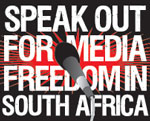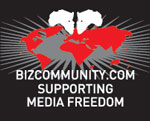
Top stories






More news


ESG & Sustainability
Redisa calls on govt to fix South Africa’s “broken” waste management system



























The past few weeks have been tough for the party, with the voice of the people ricocheting loudly off the walls of Luthuli House (ANC headquarters), sending a message of defiance, fierce opposition, concern and anguish, and foreseeing serious consequences ahead on the state of the country's freedom of expression and media liberties.
In their open letter addressed to Zuma recently, 13 academics reminded the president that four key freedoms (freedom of media, to receive or impart information or ideas, artistic creativity, academic and scientific research) are human freedoms that all successful nations protect jealously.
Analysing carefully the words 'successful nation' makes one understand that the success or failure of a nation is tied to the abovementioned freedoms.
And history teaches that the bulk of African states that have forsaken these fundamental freedoms have lost their dignity and credibility, becoming totalitarian nations and laughing stocks in the eyes of the international community. DRC, Angola, Zimbabwe, Eritrea, Ethiopia, Swaziland, Sudan, Tunisia, Congo-Brazzaville and Gambia - to name only a few - are some of these nations.

The academics' letter, printed yesterday, Sunday, 29 August 2010, in The Sunday Independent's 'ANC vs Society' section, read: "We are taken aback that it is the ANC - the party of former President Nelson Mandela - that is championing the campaign to restrict press freedom in SA today. We had always been under the impression that the ANC was an advocate for freedom."
Some observers say strong words such as these should reverberate over and over again in the ears of Zuma and its comrades, begging them to think twice before embarking on a foolish adventure that will sink Africa's last bastion of media freedom and genuine democracy.
From New York, US, the Committee to Protect Journalists (CPJ) also called on Zuma "as the head of state and leader of the ruling African National Congress (ANC) to ensure that such proposals are either amended in line with constitutional safeguards for freedom of the press and access to information, or withdrawn altogether in the interest of preserving the transparency, accountability, and democracy gained after apartheid".
Other international bodies and individuals that expressed concern about the ANC's unconstitutional moves include, among others, the International Press Institute, the World Editors' Forum and Donald Gips, the US ambassador to SA.
From ranking 26th in 2002 in the Reporters Sans Frontieres' World Freedom Index to falling seven places down (33th in 2009), SA's media freedom continues to take a dive year after year, as its leaders seek to emulate other African leaders' folie des grandeurs to suppress transparency and criticism.
Now, will the ANC ignore the popular Latin saying Vox Populi Vox Dei (people's voice is God's voice) and risk throwing the beautiful country to the lion's den? Only time will tell.
But, one thing is for sure, the findings and resolutions of the party's debate of a media document at its National General Council next month will change the course of history of Africa's biggest powerhouse.
Furthermore, educators of SA's journalists have also joined the chorus of protest and unhappiness over the ANC's attempt to control the media, with a dozen schools signing a Journalism Educators' statement, released today, Monday 30 August, Prof Guy Berger writes on the Mail & Guardian's Thought Leader today.
The statement rejects the trilogy - the media appeals tribunal, the Protection of Information Bill and intimidation of journalists such as Mzilikazi wa Afrika.
"We are concerned about what all these developments signal to young South Africans wishing to start a career in journalism," the educators' statement is quoted as saying, declaring that shortcomings in the media can only be addressed on the basis of freedom.

Last updated at 12.24 at 30 August 20210.
